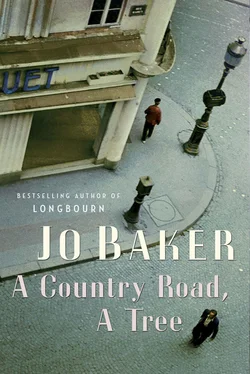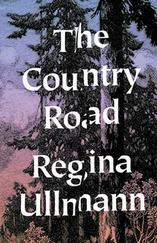He treads into his boots there, on the dirty stones. A dimpled window just beside him gives on to the lobby; he can see movement inside, scattered smears of grey uniform and flesh-pink. In German-accented French: Check all the rooms. Question everyone.
The sounds of hammering footfalls and doors flung open.
And then, softly and nearby, just beyond the grubby, distorting window, the woman begins to sob.
He walks out of the yard and down the alleyway, to where it opens into the avenue, a block down from the front of the hotel.
A glance thrown back as he steps out of the alleyway. His friend lies curled on his side on the road as if he has laid himself down there, finally, to sleep. A Gendarme stands over the body, but people steer around it anyway; they keep their distance, afraid of contamination. Blood pools between the cobblestones.
He turns away. He sets one foot in front of the other.
There’s a touch on his arm. A young lad — pimples, faint moustache, the contact they had been waiting for — who jerks his head down the avenue and says, “Shall we go?”
He makes himself walk. His legs are puppet’s legs. His arms are wood.
He squints into the low sun. Distance gathers behind him. The unknown boy walks at his side.
His boots chafe; his feet hurt.
This is good. The discomfort of the flesh. Its scourging. Its continuance.
—
There is a bed. There are four walls. There is a window. There is a little china vase on the washstand and it has dried cornflowers in it. Tomorrow there is a train south: they will try to make it across into the Zone Libre.
They are together. By a conspiracy of kindness, they are returned to each other and given an hotel room for the night. They have a towel, soap, water in the jug. He can get up and sit down and stretch out, and there is daylight sliced by the shutters.
She is not angry with him, after all. Why would she be angry? He is not to be blamed for what has happened. Rather, to be consoled.
Suzanne turns away to unbutton her blouse; she fumbles at her stockings underneath her skirt. Her hipbones show even through her slip.
He gets up and goes to the washstand. He scrubs his nails, he takes off his collar and unbuttons his shirt and scrubs his neck and under his arms. He gives her time.
And then they lie, half-dressed, unspeaking, smoking, and they do not know quite how to be together; they don’t know what is allowed and what is wanted any more. A touch elicits a shiver. An innocuous word will give offence. How did they used to do this, simply get along?
But now she lies sleeping in her slip beside him, the sheet twisted, the mattress dented under their slight weight. His thoughts drift and skip like falling leaves, and he follows them down towards the harbour water and is sinking through it.
Then blinks awake. “Oh. Hell.”
She surfaces. “What?”
“Oh God.”
“What?”
“The register.”
“What?” She’s up on an elbow, staring at him.
“When I signed the register. I think I used my real name.”
She looks at him. “ ‘Think?’ ”
“I know I did.”
She closes her eyes. She breathes. Then her eyes open again and she swings her legs off the edge of the bed and scrambles for her clothes.
“I’ll pack. You shave.”
“What?”
“I’m not going anywhere with you looking like that.”
He touches his moustache. “It’s a disguise.”
“Brothel of shit is it a disguise. It makes you look like a British officer.”
She starts tugging at her stockings, then stops herself and rolls them slowly on, because even right now at this moment stockings are far too precious to risk.
“We’ll have to find something else,” she says, furious. She tucks her blouse into her skirt.
“I’m sorry.”
“I know,” she says. “It doesn’t help.”
CHAPTER ELEVEN EN ROUTE, September 1942
It seems as though they are making good progress for a while — the countryside is spinning past, it’s a brilliant blue autumn day; beyond the window there’s a blur of saplings, brambles, browning fern. She stares out of the window; she sleeps. She isn’t really talking to him yet.
The last time they’d run, they’d run like horses run, or sheep; they’d run because they were spooked, because everyone else was running. They had run to his friends. First Shem in Vichy, then Mary and Marcel in Arcachon; there had been wine and sea-bathing, sunshine, and a fear that seems, looking back on it, so painfully innocent. Nobody had been killed; nobody had been arrested then. Not one of them was in immediate danger. They were on nobody’s list. It seems strange now that they had thought it worth their while to run at all. Because now they are alone and racing through vast darkness, and with only a tiny patch of light to aim for, and that distant and uncertain.
The train slows; it creeps past wooded banks and gravel, past warehouses and stalled goods wagons and sidings and factories and the smoke rising from high chimneys into a wide blue sky. They are inching south.
Crawling towards the shred of light they have been offered. An isolated little town, where the roads are so bad and the buildings so cramped and ramshackle that nobody bothers with it much at all. Roussillon. Her friends, the Lobs, are scraping by all right there, unmolested, even though he is Jewish. But it’s a long way off, and there’s still the border to get over, and every mile they travel seems to take longer than the mile before.
And then the train slides aside from the main track and stops, between the workshops and warehouses and the smallholdings trailing with dead beanstalks and the still-green creep of pumpkin plants.
Time ticks. The light fades. The air is full of cigarette smoke and body smells. Nothing happens.
A woman sits with a basket on her knee; her two boys had wriggled and complained and played mon p’tit doigt me dit for a while, but are now slumped against her, caps askew, asleep. It’s not them snoring, though: that’s someone else. And further down the carriage a woman just keeps on talking — a thick sound to her voice, as though her throat is clotted. A long low spool of talk, winding on and on and on. On and on and on.
On the main line a train goes thundering by; a stream of green and yellow. And then it’s gone.
Theirs doesn’t move. The shadows deepen. That woman, he notices, is talking about her hens. How her son used to look after them, how they were his pride and joy, how they were marl and blue and red.
He looks at his watch. Raises it to his ear. Looks at it again. He winds it, his eyes following a flight of starlings as it dips and weaves across the orange sky.
And they had a red rooster who could stare down the Pope, eyes like elderberries, peck at your ankles when you went in to fetch the eggs. But with her son, never gave him any trouble at all. Adored him, did that rooster.
The sun slides beyond the buildings, melon-pink. Suzanne’s head sinks on to his shoulder. His cheek rests on her hair. He blinks. This might be the beginnings of forgiveness.
“Do you remember,” she murmurs, “in Cahors? All that rain.”
He nods, his cheek ruffling her hair, the stubble snagging.
The electric lights do not come on. The woman talks about her orchard, how the boy would scramble up to pick the apples, and she would have scolded him, but what was the point? He would just have gone scrumping elsewhere and got into worse trouble for it.
He blinks slow blinks.
Then a train door slams. And there are voices. New voices.
Suzanne jerks awake. He touches her hand. They listen.
Compartment doors slide open; brisk requests, replies; doors slide shut. Papers are being checked — and the woman continues, buzzing like radio static, while they strain to hear over her. His hands grip, his jaw tightens, but it will be fine, of course it will be fine: their papers are good. They have been told that they are good. So much trouble has been taken, so many risks have been run on their behalf.
Читать дальше










